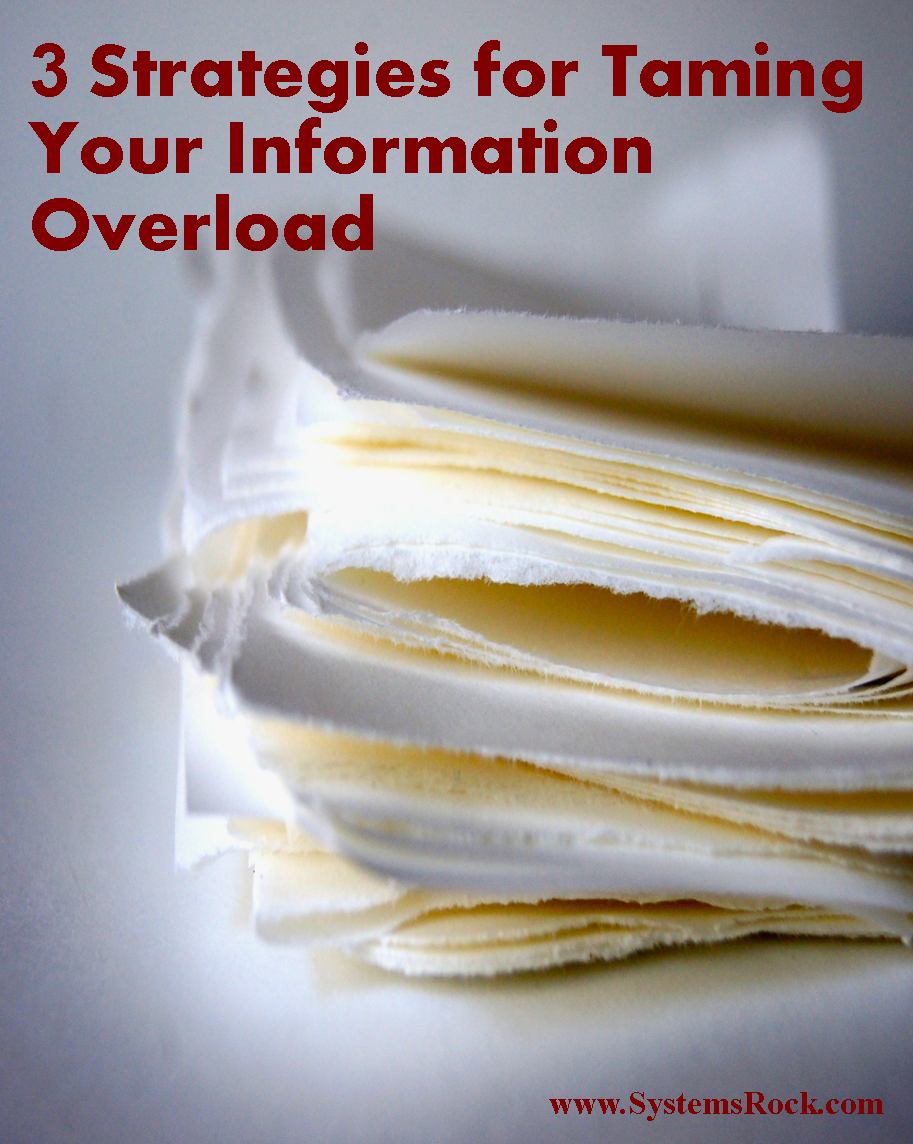Today Natasha Vorompiova from Systems Rock is guest posting for us. She’s designed productivity systems for entreprenuers that work outside the traditional office world. Check out her site HERE.
In our quest to become the go-to expert in our fields, we often wind up feeling overwhelmed by the information we encounter as we keep our fingers pressed firmly on the pulse of our industries.
It seems as though as soon as we get our inboxes down to zero they fill up once again with newsletters and updates from other experts.
Today, I want to share with you some simple strategies that you can put into practice right now to tame your information overload and prevent burn out:
1. Internal Information
Create a manageable number of hubs to store your key information. Depending on the type of information and how accessible you need it to be, you might need a variety of tools:
- Your computer, external hard disk drives, or flash drives are great for permanent storage of large amounts of data you created yourself or have collected.
- Google Drive, Dropbox, and Evernote are wonderful online tools for organizing, storing and sharing digital documents. They are especially convenient for creating and sharing idea banks, notes, checklists, procedures, and tracking logs for how you run your business. Just make sure to create a uniform labeling system, so you can quickly find what you need.
- Doo is a fantastic free tool that automatically organizes digital documents on your hard drive, in Dropbox, and your email. It also allows you to sync your files to the cloud and across multiple devices and computers.
- Working with physical documents? Consider the Tickler system. The idea behind this system is to create a structure that “tickles” your memory and reminds you what needs to be done on any given day. This system suggests a collection of date-labeled physical folders. Each one of them contains documents (to-do lists, files, unpaid invoices, etc.) that need to be taken care of on the date indicated on the folder. It allows you to stay organized and keep your physical documents in order.
- You certainly need a secure location for your passwords. It can be as simple as saving the info in a password-protected spreadsheet on your hard drive. You may also use special software like 1Password or LastPass that allows you to keep your passwords in one centralized location and effortlessly retrieve them when opening corresponding sites. (See the Risk Management System to learn more).
2. External Information
Keep an eye on the developments in your industry and engage your readers in attention-grabbing discussions about them by using an RSS Reader, which provides you with one neatly organized place (that’s easy to navigate) for receiving updates from your favorite websites. They automatically deliver these updates to you, so you don’t have to spend time visiting each site.
Organize articles you read, by using Pocket . It’s free and helps tame information overload. With just one click, you will be able to save articles to read at a later date. You can check the articles off as you read them.
There are also tools like Hootsuite to help you keep an eye on the information shared by your target list of people you want to get to know and develop relationships with. We’ll discuss them in depth when we talk about your Social Media System.
3. Knowledge to Acquire
It’s true. You’ve got to be constantly learning. Technology is always changing, new tactics come out and new gadgets help us do things easier and faster. But, learning should not be a time suck.
Set your goals and see if there are any knowledge gaps preventing you from reaching them.
Then, ask yourself:
- How much time will it actually take me to master this skill? Will learning it be an efficient use of my time or I should just hire someone to do it for me?
- How much time do I have available to learn this tactic? Can I commit to devoting 2 hours a week to go through the course module and do the homework?
If you decide that learning that skill or tactic is to your advantage, create a schedule for yourself. For instance, you could set aside January and February to learn SEO, March to master Google Analytics, and April and May to discover the ins and outs of blogging.
Know what you want to achieve and ONLY commit to things that will help you reach these goals (and at a pace that will not destroy you).
Learning is important, but you don’t want to turn it into excuse not to take action.
Remember this: you are enough.
You already know enough to take a few steps that will shoot your business to the next level.
All you have to do is to take the next step. Just the way you are, knowing what you know, having what you have.
Believe in yourself and the difference you make in the lives of your clients.

